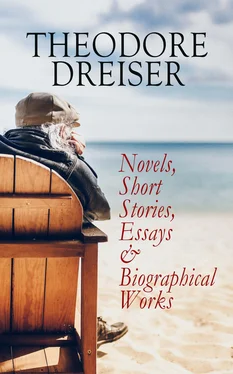Nevertheless, one of the results of Mrs. Vance’s suggestions was the fact that on this occasion Carrie was dressed somewhat to her own satisfaction. She had on her best, but there was comfort in the thought that if she must confine herself to a best, it was neat and fitting. She looked the well-groomed woman of twenty-one, and Mrs. Vance praised her, which brought colour to her plump cheeks and a noticeable brightness into her large eyes. It was threatening rain, and Mr. Vance, at his wife’s request, had called a coach. “Your husband isn’t coming?” suggested Mr. Vance, as he met Carrie in his little parlour.
“No; he said he wouldn’t be home for dinner.”
“Better leave a little note for him, telling him where we are. He might turn up.”
“I will,” said Carrie, who had not thought of it before.
“Tell him we’ll be at Sherry’s until eight o’clock. He knows, though I guess.”
Carrie crossed the hall with rustling skirts, and scrawled the note, gloves on. When she returned a newcomer was in the Vance flat.
“Mrs. Wheeler, let me introduce Mr. Ames, a cousin of mine,” said Mrs. Vance. “He’s going along with us, aren’t you, Bob?”
“I’m very glad to meet you,” said Ames, bowing politely to Carrie.
The latter caught in a glance the dimensions of a very stalwart figure. She also noticed that he was smooth-shaven, good looking, and young, but nothing more.
“Mr. Ames is just down in New York for a few days,” put in Vance, “and we’re trying to show him around a little.”
“Oh, are you?” said Carrie, taking another glance at the newcomer.
“Yes; I am just on here from Indianapolis for a week or so,” said young Ames, seating himself on the edge of a chair to wait while Mrs. Vance completed the last touches of her toilet.
“I guess you find New York quite a thing to see, don’t you?” said Carrie, venturing something to avoid a possible deadly silence.
“It is rather large to get around in a week,” answered Ames, pleasantly.
He was an exceedingly genial soul, this young man, and wholly free of affectation. It seemed to Carrie he was as yet only overcoming the last traces of the bashfulness of youth. He did not seem apt at conversation, but he had the merit of being well dressed and wholly courageous. Carrie felt as if it were not going to be hard to talk to him.
“Well, I guess we’re ready now. The coach is outside.”
“Come on, people,” said Mrs. Vance, coming in smiling. “Bob, you’ll have to look after Mrs. Wheeler.”
“I’ll try to,” said Bob smiling, and edging closer to Carrie. “You won’t need much watching, will you?” he volunteered, in a sort of ingratiating and help-me-out kind of way.
“Not very, I hope,” said Carrie.
They descended the stairs, Mrs. Vance offering suggestions, and climbed into the open coach.
“All right,” said Vance, slamming the coach door, and the conveyance rolled away.
“What is it we’re going to see?” asked Ames.
“Sothern,” said Vance, “in ‘Lord Chumley.’”
“Oh, he is so good!” said Mrs. Vance. “He’s just the funniest man.”
“I notice the papers praise it,” said Ames.
“I haven’t any doubt,” put in Vance, “but we’ll all enjoy it very much.”
Ames had taken a seat beside Carrie, and accordingly he felt it his bounden duty to pay her some attention. He was interested to find her so young a wife, and so pretty, though it was only a respectful interest. There was nothing of the dashing lady’s man about him. He had respect for the married state, and thought only of some pretty marriageable girls in Indianapolis.
“Are you a born New Yorker?” asked Ames of Carrie.
“Oh, no; I’ve only been here for two years.”
“Oh, well, you’ve had time to see a great deal of it, anyhow.”
“I don’t seem to have,” answered Carrie. “It’s about as strange to me as when I first came here.”
“You’re not from the West, are you?”
“Yes. I’m from Wisconsin,” she answered.
“Well, it does seem as if most people in this town haven’t been here so very long. I hear of lots of Indiana people in my line who are here.”
“What is your line?” asked Carrie.
“I’m connected with an electrical company,” said the youth.
Carrie followed up this desultory conversation with occasional interruptions from the Vances. Several times it became general and partially humorous, and in that manner the restaurant was reached.
Carrie had noticed the appearance of gayety and pleasure-seeking in the streets which they were following. Coaches were numerous, pedestrians many, and in Fifty-ninth Street the street cars were crowded. At Fifty-ninth Street and Fifth Avenue a blaze of lights from several new hotels which bordered the Plaza Square gave a suggestion of sumptuous hotel life. Fifth Avenue, the home of the wealthy, was noticeably crowded with carriages, and gentlemen in evening dress. At Sherry’s an imposing doorman opened the coach door and helped them out. Young Ames held Carrie’s elbow as he helped her up the steps. They entered the lobby already swarming with patrons, and then, after divesting themselves of their wraps, went into a sumptuous dining-room.
In all Carrie’s experience she had never seen anything like this. In the whole time she had been in New York Hurstwood’s modified state had not permitted his bringing her to such a place. There was an almost indescribable atmosphere about it which convinced the newcomer that this was the proper thing. Here was the place where the matter of expense limited the patrons to the moneyed or pleasure-loving class. Carrie had read of it often in the “Morning” and “Evening World.” She had seen notices of dances, parties, balls, and suppers at Sherry’s. The Misses So-and-so would give a party on Wednesday evening at Sherry’s. Young Mr. So-and-So would entertain a party of friends at a private luncheon on the sixteenth, at Sherry’s. The common run of conventional, perfunctory notices of the doings of society, which she could scarcely refrain from scanning each day, had given her a distinct idea of the gorgeousness and luxury of this wonderful temple of gastronomy. Now, at last, she was really in it. She had come up the imposing steps, guarded by the large and portly doorman. She had seen the lobby, guarded by another large and portly gentleman, and been waited upon by uniformed youths who took care of canes, overcoats, and the like. Here was the splendid dining-chamber, all decorated and aglow, where the wealthy ate. Ah, how fortunate was Mrs. Vance; young, beautiful, and well off – at least, sufficiently so to come here in a coach. What a wonderful thing it was to be rich.
Vance led the way through lanes of shining tables, at which were seated parties of two, three, four, five, or six. The air of assurance and dignity about it all was exceedingly noticeable to the novitiate. Incandescent lights, the reflection of their glow in polished glasses, and the shine of gilt upon the walls, combined into one tone of light which it requires minutes of complacent observation to separate and take particular note of. The white shirt fronts of the gentlemen, the bright costumes of the ladies, diamonds, jewels, fine feathers – all were exceedingly noticeable.
Carrie walked with an air equal to that of Mrs. Vance, and accepted the seat which the head waiter provided for her. She was keenly aware of all the little things that were done – the little genuflections and attentions of the waiters and head waiter which Americans pay for. The air with which the latter pulled out each chair, and the wave of the hand with which he motioned them to be seated, were worth several dollars in themselves.
Once seated, there began that exhibition of showy, wasteful, and unwholesome gastronomy as practised by wealthy Americans, which is the wonder and astonishment of true culture and dignity the world over. The large bill of fare held an array of dishes sufficient to feed an army, sidelined with prices which made reasonable expenditure a ridiculous impossibility – an order of soup at fifty cents or a dollar, with a dozen kinds to choose from; oysters in forty styles and at sixty cents the half-dozen; entrees, fish, and meats at prices which would house one over night in an average hotel. One dollar fifty and two dollars seemed to be the most common figures upon this most tastefully printed bill of fare.
Читать дальше












